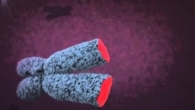
Scientists say the human brain is programmed to seek out unhealthy food
1
Researchers from the Netherlands studied people's nighttime snacking on sweets, spicy and fatty foods. Even in the dark, the participants in the experiment were able to find tasty food without fail. Scientists concluded that it's not just about good memory – the human brain can actually be programmed to search for high-calorie food.
Their experiment showed that people are significantly better at remembering where unhealthy foods are stored than their healthier counterparts. In other words, the human brain evolved to focus on remembering where high-calorie foods are located. The study authors theorize that this allowed our hunter-gatherer ancestors to survive in harsh environments with few food options.
In the course of the study, 512 participants were tested, who went through a kind of food memory maze. The researchers had the group follow a fixed route through a room where eight foods or food flavorings were strategically placed.
Each participant sampled food or sniffed flavored pads as they walked through the maze. These tasty treats ranged from apples and cucumbers to potato chips and chocolate brownies. The group was also asked to rate how much they liked each food they encountered. The scientists then gave the volunteers a surprise test on where these snacks were.
The results showed that the group was 27% more accurate in choosing the correct location of high-calorie foods. This ability probably served humans well in the distant past. However, scientists are sure that today it can lead to health problems. A brain that can resist the urge to hunt for sweeter snacks is more likely to avoid the effects of junk food. Currently, researchers are studying how the displacement of high-calorie memory affects modern eating habits.









Leave a Reply